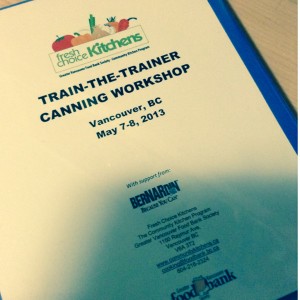At last, our group has completed the final round of Skype interviews. The constructive feedback from the canning trainers and environmental health officers (EHO) have been taken into consideration as our group continues to improve the FAQ and the scientific  component of the manual. We hope to ultimately develop a product with sufficient details, but is also clear, concise and understandable for the canning trainers. For the final report, we have been conducting our literature review to support our analysis in the discussion. Most studies agree that the knowledge of home preservation or food literacy increases food security by reducing consumer spending, learning to prepare healthy meals from all food groups and practicing food safety. After compiling the interview responses, we found that all interviewees agree that educating people on home food preservation will improve their food literacy in terms of increasing their knowledge on food safety, nutritional aspects of canning ingredients and seasonality of fruits. On the other hand, most interviewees express that there is not a definite answer to the question regarding whether education on home food preservation contributes to improved food security. The fact whether people may actually apply food preservation techniques at home depends on a variety of factors, such as their economic status, access to equipment, time availability and residence. Currently, we are still reviewing the interview responses to further analyze the various factors, which may affect the likelihood of people preserving food at home.
component of the manual. We hope to ultimately develop a product with sufficient details, but is also clear, concise and understandable for the canning trainers. For the final report, we have been conducting our literature review to support our analysis in the discussion. Most studies agree that the knowledge of home preservation or food literacy increases food security by reducing consumer spending, learning to prepare healthy meals from all food groups and practicing food safety. After compiling the interview responses, we found that all interviewees agree that educating people on home food preservation will improve their food literacy in terms of increasing their knowledge on food safety, nutritional aspects of canning ingredients and seasonality of fruits. On the other hand, most interviewees express that there is not a definite answer to the question regarding whether education on home food preservation contributes to improved food security. The fact whether people may actually apply food preservation techniques at home depends on a variety of factors, such as their economic status, access to equipment, time availability and residence. Currently, we are still reviewing the interview responses to further analyze the various factors, which may affect the likelihood of people preserving food at home.
During the week, we have discussed the layout and key points that we will be addressing for the plenary presentation. Since only three minutes are allocated for each group, it is impossible for every member to offer his or her contribution. Hence, both Nathan and Drew have volunteered to speak on our group’s behalf. We also believe that it would only be fair if the other members assist the presenters by posting their results, interpretations and personal reflections online. Having devoted over two months of effort on this project, we are looking forward to showcasing our results to other LFS 350 groups on Wednesday!

Much to our dismay, our group was unable to plan a second site visit to GVFBS last week due to conflicts in scheduling. We would have toured their warehouse and noted down the trends in the type of charitable foods donated over the years. Moreover, it would have been a great volunteer opportunity if we could participate and assist trainers with their canning workshops. It will have enabled us to better meet the needs of our community partner and the canning trainers by identifying which sections of the manual requires further explanation. Nevertheless, our interviews with the canning trainers may be considered as an indirect form of community engagement. We are not only including the voices from our group, but also from the canning trainers, EHOs and canning workshop participants (through the trainers’ feedback) when answering our research questions regarding food literacy and food security. Through this dialogue, my group can gain a better understanding of the barriers that food insecure individuals are facing in the community and the reasons that participants would choose to attend the canning workshops. Given that food literacy does increase food security, we hope that our findings and recommendations from this research project may assist our community partner and/or future groups to further address the issue of food security through home food preservation.
For the following week, we aim to complete our designated parts for the draft report by Sunday. The main points from our report will be used to formulate our final presentation. We will then meet on Monday to discuss and put together the powerpoint presentation.
One more week to go!


